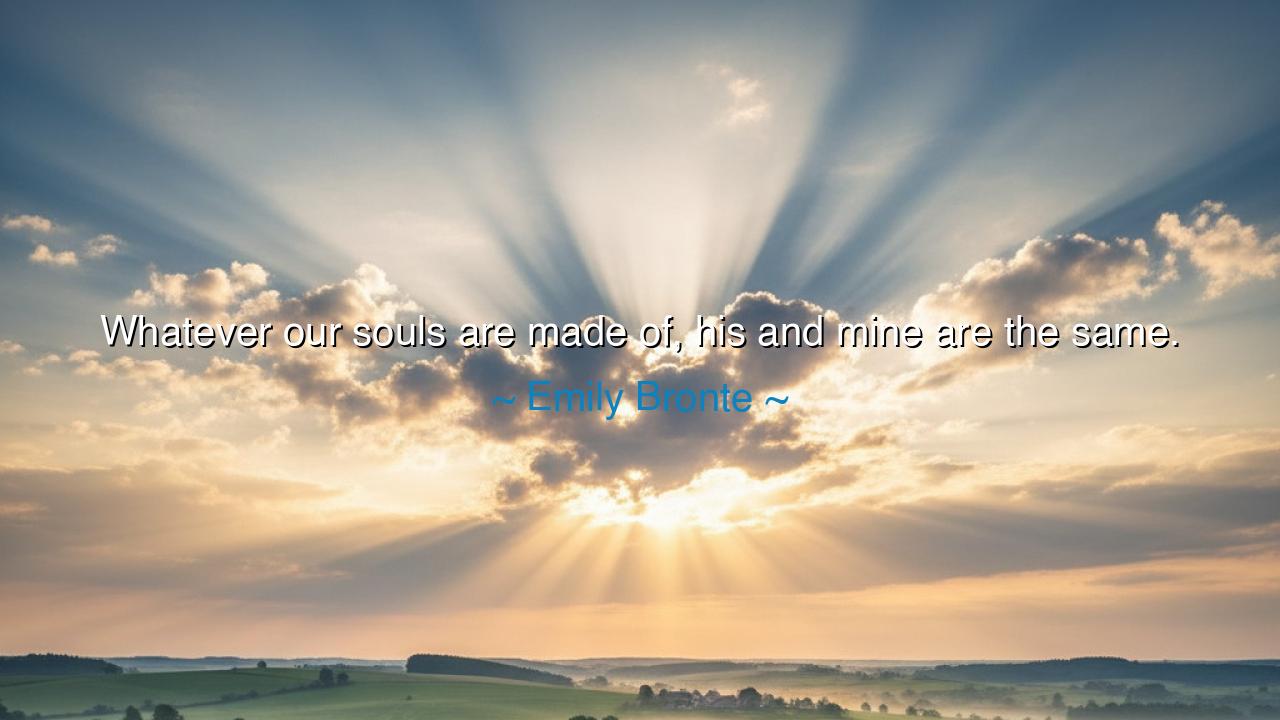
Whatever our souls are made of, his and mine are the same.






"Whatever our souls are made of, his and mine are the same." – Emily Brontë
In the quiet moors of Yorkshire, where the winds whisper of eternity and the earth itself seems haunted by longing, Emily Brontë wrote these immortal words. They speak not merely of love, but of oneness — of that rare and sacred bond where two souls are not merely joined, but mirrors of each other. When she wrote, “Whatever our souls are made of, his and mine are the same,” she revealed the essence of a connection that transcends flesh, time, and even death itself. It is the love of spirit recognizing spirit, of eternity remembering eternity.
To the ancients, such a union was the mark of destiny. They spoke of soulmates not as lovers bound by circumstance, but as halves of a single divine spark, separated by the heavens and wandering through mortal life until reunion. Brontë understood this truth deeply — that real love is not born of desire, nor sustained by beauty, but exists because the souls of two beings are made of the same substance. They breathe the same fire, dream the same dreams, and ache with the same silence when apart.
In her masterpiece Wuthering Heights, Brontë gave this truth a voice through Catherine and Heathcliff — two beings whose bond defied social law, earthly comfort, and moral judgment. Their love was wild, terrible, and eternal. Catherine says, “I am Heathcliff,” not in romance alone, but in recognition: she knows that they share one spirit in two bodies. Though the world sought to tear them apart, death itself could not unmake what heaven had fashioned. Such is the terrible beauty of soul-deep love — it cannot be created, nor can it be destroyed.
Yet we must not mistake soul unity for mere passion. Passion burns bright and then fades into ash; soul connection endures even in the stillness. History gives us many examples — one of them being John Keats and Fanny Brawne, whose love was never fulfilled in life. Separated by poverty and illness, they never married. Yet in letters that survived them both, their words reveal that their spirits had already intertwined. When Keats wrote, “I have been astonished that men could die martyrs for religion — I have shuddered at it — I shudder no more. I could be martyred for my religion — Love is my religion — I could die for that,” he echoed Brontë’s truth: that when two souls are of the same essence, even the body’s death cannot divide them.
Such love does not seek ownership; it seeks recognition. It asks not, “Do you love me?” but “Do you know me?” For when souls are alike, they find in one another a reflection of the divine. To see another and say, “You are made of what I am made of,” is to glimpse eternity. This love teaches us humility — for it shows that we are not complete within ourselves, but are part of something vast and sacred, carried across lifetimes and worlds.
Yet, few find such connection without first knowing themselves. To recognize a kindred soul, one must first recognize one’s own. If you wish to find a love like Brontë’s, begin with your own heart. Know what your soul is made of — your virtues, your flaws, your dreams, your pain. Only when you stand whole in your truth will you be able to see another whose light resonates with yours. For the mirror of love can only reflect clearly in a mind and heart that have faced their own reflection.
So remember this, seekers of truth: Whatever our souls are made of, his and mine are the same is not just a confession of love — it is a revelation of divine unity. It teaches that the greatest love is not possession, but recognition; not desire, but understanding. Cultivate your soul, for that is where true union begins. When you meet another whose soul sings in harmony with yours, cherish it — not as a prize to keep, but as a sacred reminder that we are never truly alone.
And when the storms of life arise, as they always do, hold fast to this wisdom: what is born of the same soul can never be lost. For love that springs from the depths of being does not fade with distance, nor crumble with time — it endures, as the stars endure, shining quietly across the centuries, calling one soul to another through the endless night.






AAdministratorAdministrator
Welcome, honored guests. Please leave a comment, we will respond soon